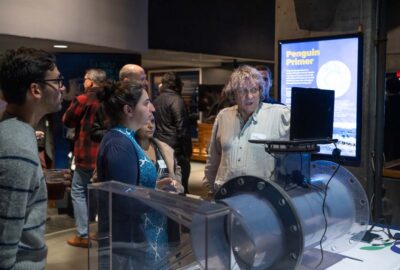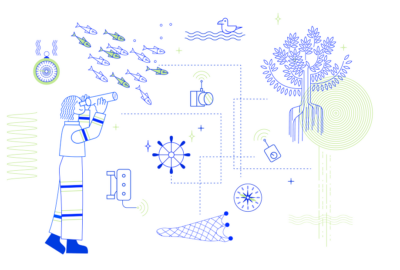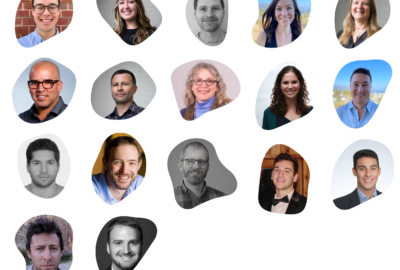BlueSwell Cohort IV Founders Gather in Rhode Island for Mentorship, Networking, and More
By New England Aquarium on Tuesday, December 12, 2023

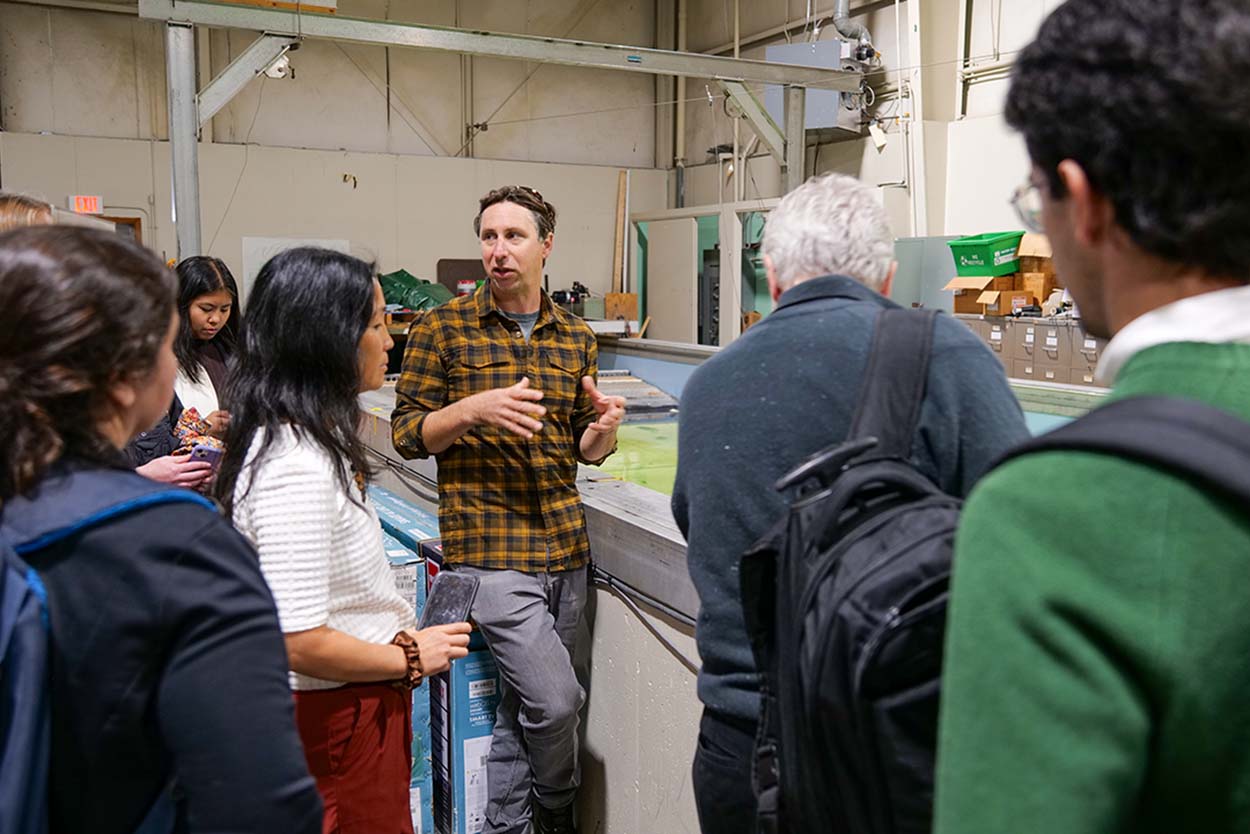
In early November, BlueSwell startup founders gathered at the University of Rhode Island’s (URI) Coastal Resources Center for the beginning of BlueSwell Rhode Island Week, a three-day session designed to foster the growth of each of their businesses.
The founders—Joe Wheeler of Bluemvmt, Carlos Muñoz Royo of atdepth MRV, and Garrett Boudinot of Vycarb—are part of the fourth cohort in the BlueSwell program, a blue technology startup incubator founded by the New England Aquarium and SeaAhead.
Each founder in BlueSwell receives funding, mentorship, and a host of networking opportunities—the latter being the focus of the day in Rhode Island. Events like BlueSwell Rhode Island Week are a regular part of the BlueSwell program, and the meeting at URI would be the first in a series of opportunities during the week for the BlueSwell founders.
Beck Hayes, the Rhode Island regional manager and operations associate at SeaAhead, organized the events and schedule for BlueSwell Rhode Island Week. “Our objectives for BlueSwell Rhode Island Week were centered on facilitating meaningful connections between our BlueSwell cohort and industry experts and academics, as well as potential customers and partners,” Hayes said. “These connections play a pivotal role in advancing [the BlueSwell founders’] businesses within the Ocean State, where dedicated individuals are making a significant impact on sustainable ocean technology.”
Tapping into the opportunities of the blue economy
The discussion at the Coastal Resources Center, led by Communications Specialist Sue Kennedy and Chief Business Development Officer for URI’s Research Foundation, Pete Rumsey, was the first of many on a day that brought together innovators, academics, and business leaders around the goal of tapping into opportunities afforded by a growing blue economy
“There are so many blue economy connections,” said Kennedy, emphasizing how each sector—from fisheries and aquaculture to renewable energy—contributes to overall growth and sustainability. Those interconnected sectors often have shared, rather than competing, needs, which both Rumsey and Kennedy viewed as an opportunity for bluetech leaders like the Blueswell founders.
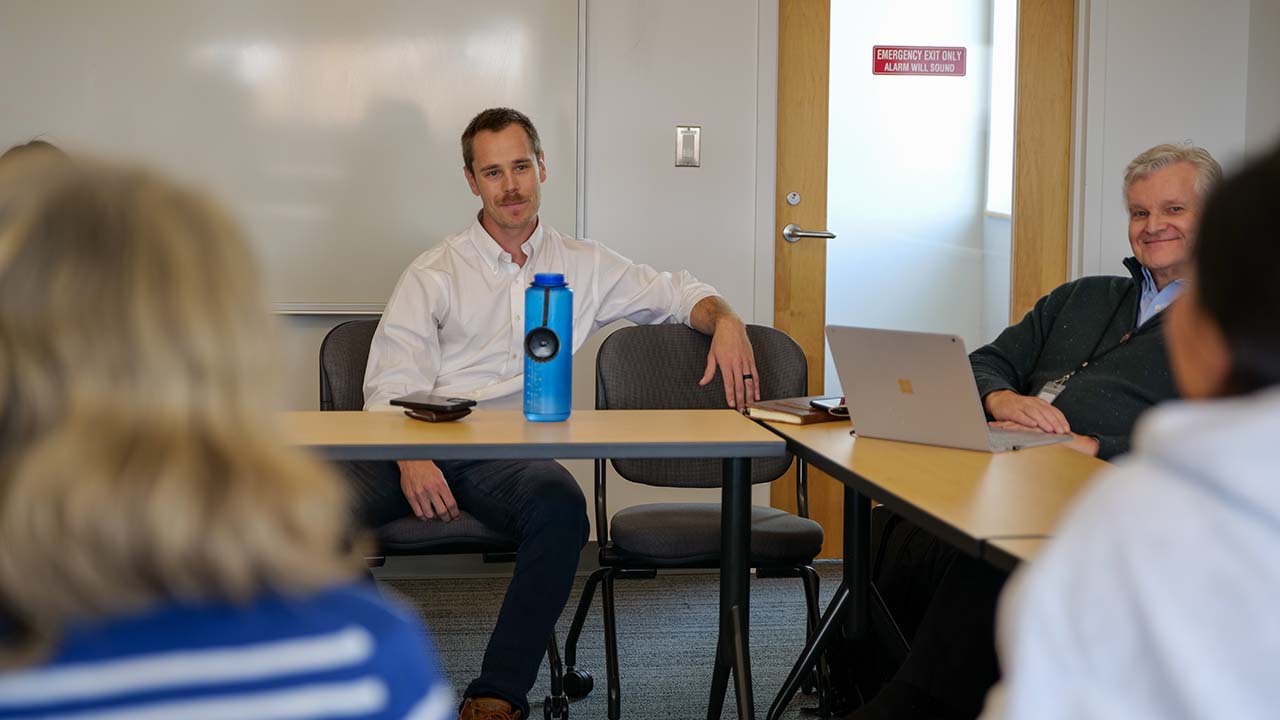
In Rhode Island, URI and the Coastal Resources Center are driving connections between business leaders, researchers, and established markets. “We really are a resource powerhouse for people, and we can connect you to what you need for your business idea,” Kennedy said to the group. “The crazier the idea, the better. We love those ones.”
Though, the ideas coming out of BlueSwell are anything but. Each startup represents an innovative, creative solution to some of the biggest challenges facing the ocean. With atdepth MRV, Royo and his team are working to develop cost-effective measurement, reporting, and verification for marine carbon dioxide removal projects in the ocean. Boudinot and Vycarb built a hardware-software solution to perform fully measured removal and storage of carbon in water, with pilot systems currently deployed around New York City and Long Island. With Bluemvmt, Wheeler is working to create a “platform as a service” for ocean research, building software that helps better synthesize data from disparate sources. Three companies with different approaches to increasingly complex problems—as Kennedy emphasized, in the face of climate change, there’s “never been a greater need” for the kind of innovation BlueSwell helps support.
Connecting academia, industry, and innovators
Next, the BlueSwell founders met with Dr. Brennan Phillips, an assistant professor and researcher at URI’s Graduate School of Oceanography. Phillips led the group on a tour of some of URI’s research facilities, including his own lab, where he shared some of his recent work to create smaller, less expensive, and more nimble deep-sea sensors and imagers.
Phillips’ work served as an example of how a research setting like URI can support start-ups. The deep-sea imagers and 3D-printed housing Phillips presented to the group are made in part for Juice Robotics, a start-up that was founded by URI graduate students Christine de Silva and Matt Jewell, and to which Phillips serves as an academic partner.
Following the campus tour, the BlueSwell founders also met with two additional URI faculty members—Jaime Palter and Hongjie Wang—as well as the Business Development Manager at Oceantic Network, Jamie Buck. With Palter and Wang, the group discussed opportunities for growing the blue economy workforce pipeline, connecting students with startups, and tapping into needed skillsets for the founders’ growing small businesses.
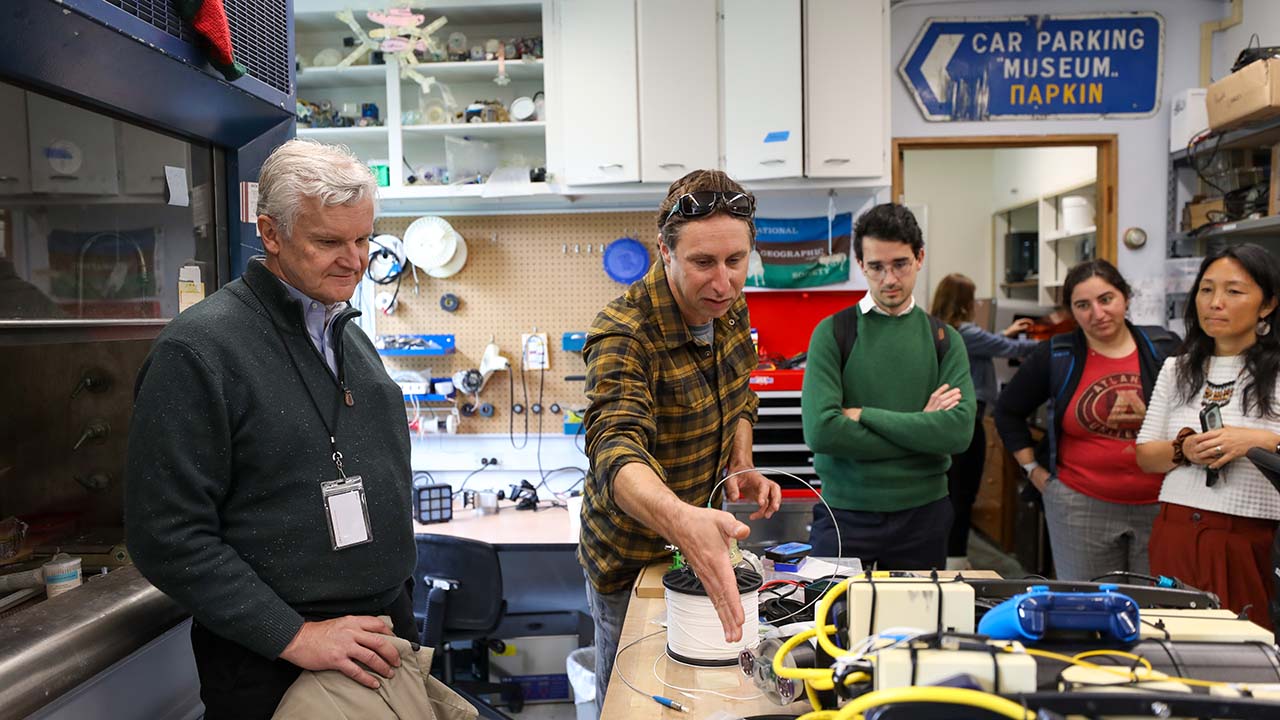
In addition, overlapping interest and research areas between Palter and Wang’s work and the challenges the BlueSwell founders are tackling underscored the immense opportunities to connect universities, innovators, and communities in order to grow the blue economy and protect the planet. For one founder, Boudinot, the meeting led to the start of a collaborative effort to test a prototype of Vycarb’s instruments on campus at URI.
Of the direct connections BlueSwell made between URI faculty and startups working in the field, Palter told the group it was the “first time” an opportunity like this had arisen.
Similarly, Buck spoke to network building as a key stepping stone for achieving startup growth. At Oceantic, a member-based organization dedicated to growing offshore wind and other ocean renewables, Buck works to connect the dots for clients in a rapidly growing—and increasingly complicated—industry.
Making ocean conservation actionable
The final event of the day gathered a room full of ocean economy experts, Rhode Island policymakers, and more at CIC Providence, a coworking space and “innovation center” that serves as a hub for many startups in Rhode Island. Emiley Lockhart, the Aquarium’s associate vice President for Ocean Sustainability, Technology, and Innovation, introduced the BlueSwell founders to the crowd.
“As part of the innovation mission for the New England Aquarium, when we think about ocean conservation, we think about how we’re going to make that actionable,” Lockhart said. With BlueSwell, the Aquarium and SeaAhead are helping enhance ocean health by lending support to these startup founders and encouraging innovation—the breadth of which was soon on display in each founder’s short presentation to the crowd. From marine carbon dioxide removal to lab-cultivated seafood, the challenges and opportunities each member of BlueSwell cohort IV is tackling are diverse—but all have the potential to generate positive change for the ocean. BlueSwell is designed so that as each company rides the wave of early-stage entrepreneurship, they’re better prepared for success.
Lena Weiss, the program officer for BalanceBlue Lab at the Anderson Cabot Center for Ocean Life and manager of the BlueSwell program for the Aquarium, echoed Lockhart’s vision for helping ocean conservation startups enact meaningful change. “These sessions introduce the cohort to the wider bluetech community, allow them to make in-person connections with experts, and explore additional resources available to them.”
BlueSwell, a partnership between SeaAhead and the New England Aquarium, takes a whole-ocean approach to fighting climate change and advancing the blue economy. The program focuses on bridging gaps between innovators, ocean experts, industries, and the venture community. BlueSwell leverages SeaAhead’s bluetech domain expertise, network, and experience in building companies, and the Aquarium’s 50-plus year history of using marine science to protect the ocean and marine animals to ultimately convert ocean-focused concepts into profitable, sustainable businesses.

